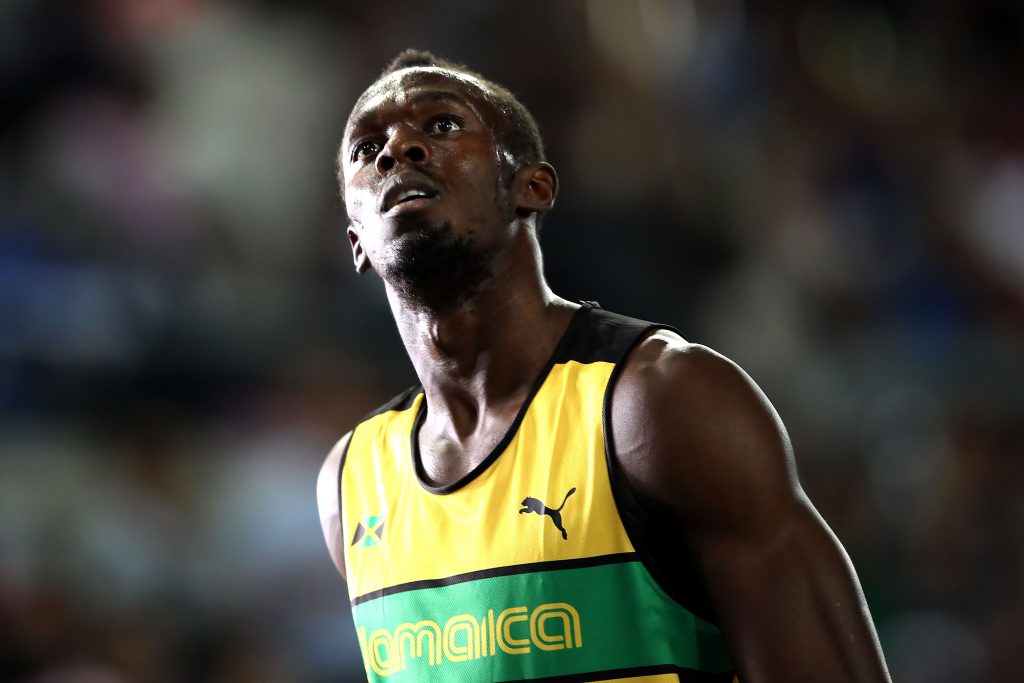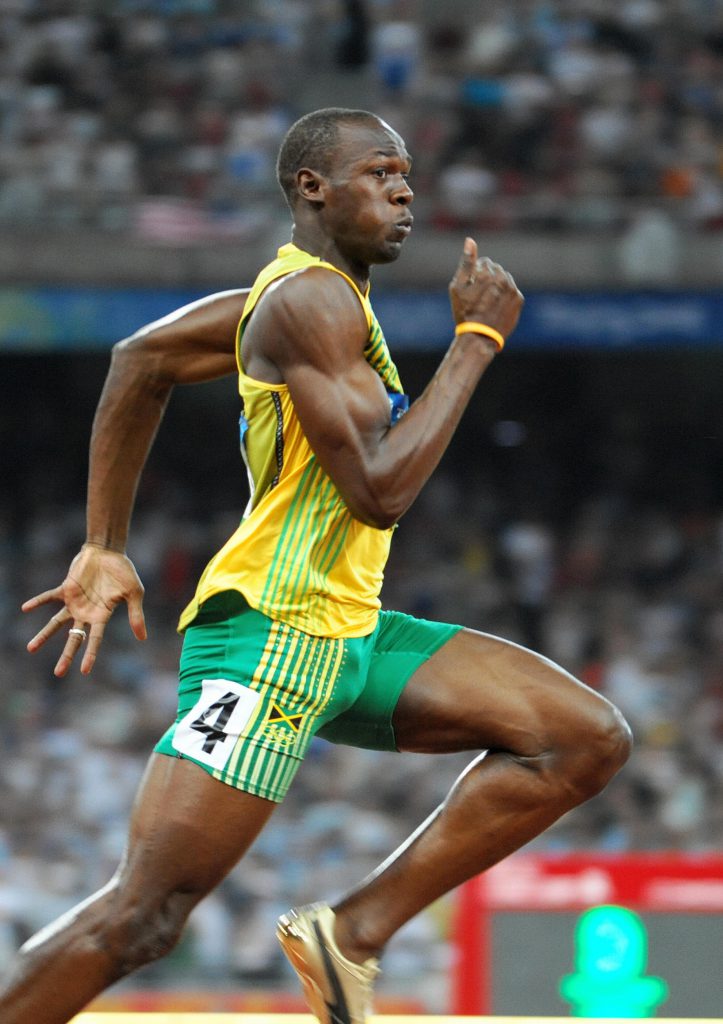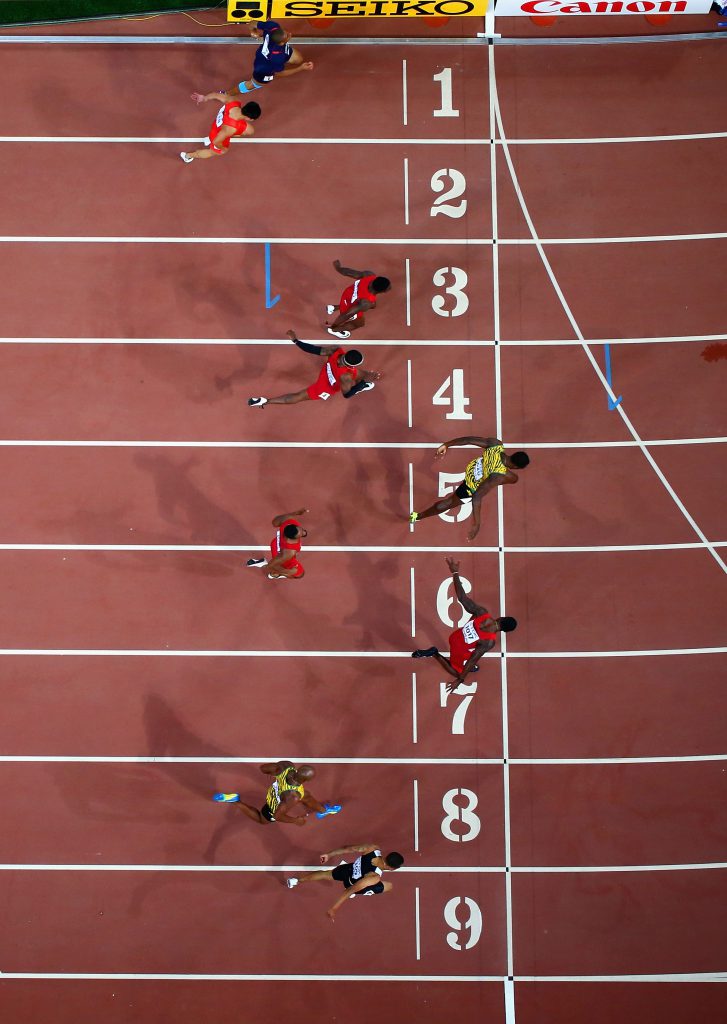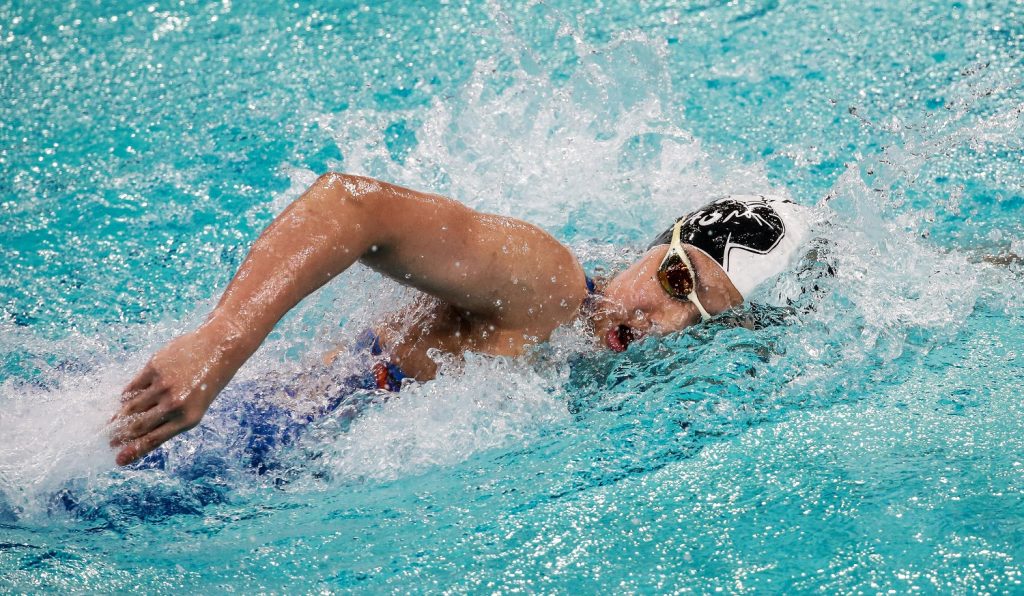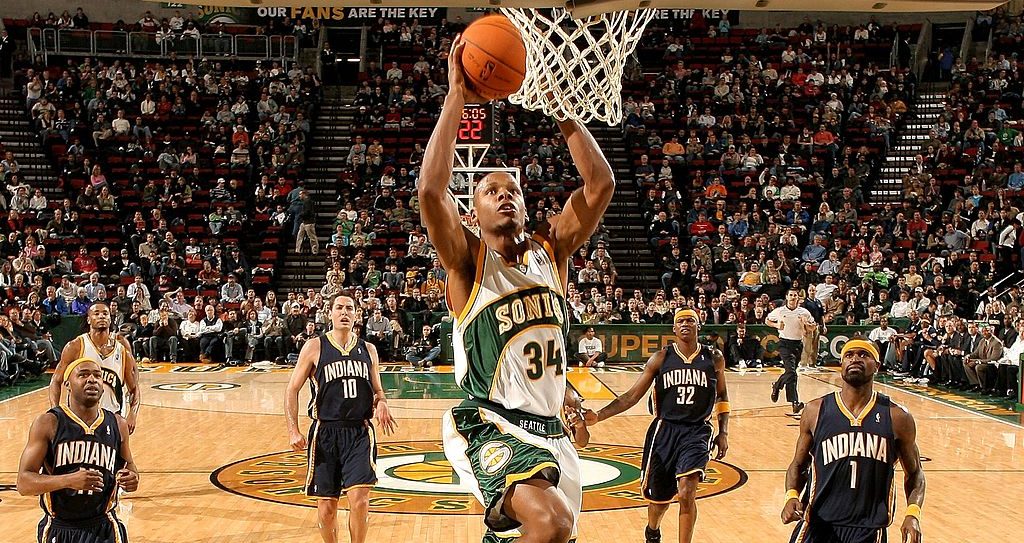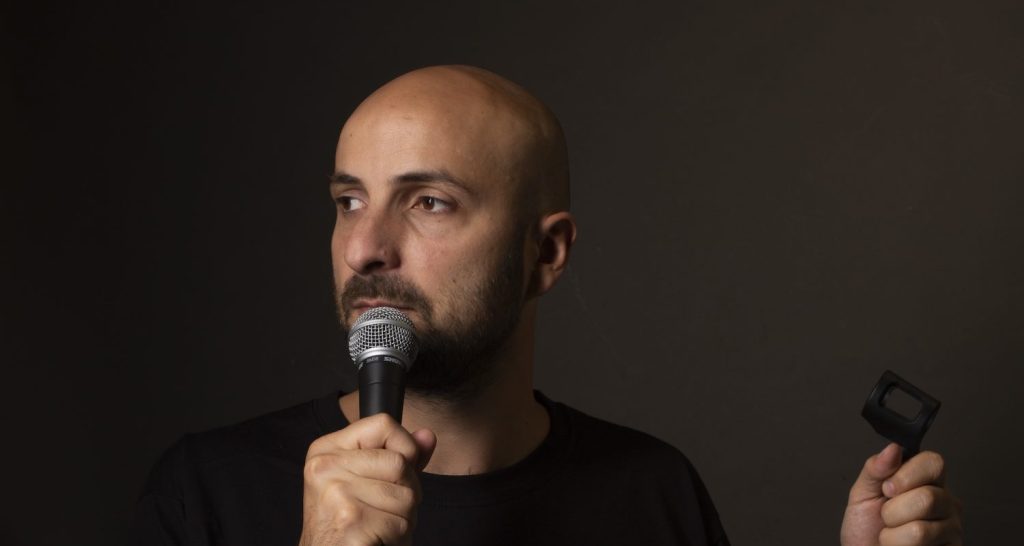He – but a child of eight – turns around and looks at you, smiles and flashes a thumbs-down. He has defeated you, again. “My grandfather starts faster than you”. This time you were almost there, two or three more meters and you would have been a foot ahead, at eighty you felt his heart beat, the short rhythm of his steps, you were devouring the ground, but then it was all over. “And you breathe hard like my grandmother, who smokes. You couldn’t get down there without crawling”. You are friends, and always have been. And there is no doubt about who is the fastest. You are. Except for here, on the hundred-meter sprint – the distance of the gods. For the ancients, this was a mere hundred paces, but it will never be that simple for you. The melancholy that you strive to hide is not envy. It’s just the fact that he beats you on your home turf. And it’s true. You are slow off the mark, clumsy, your body crumples as you transition between ready, set and go – as you crouch, rise to the kneel, and leave the mark with the gun. No one as tall as you are could ever hope to outdistance his own shadow in the hundred-meters. But you are the son of lightning and you feel this rhythm that rises from the earth of your origins, moving your muscles, making them dance. It is not yet your time. “Wake up and live. Life is one big road with lots of signs”.
That little human is Ricardo Geddes. The improvised track runs in front of the elementary school of Sherwood Content, a small town in the Trelawny district, and the song that you were listening to is an old track by Bob Marley. Your mother is convinced that I am talking about you, and of course, you live in Jamaica. Your dream is to become a cricketer; your challenges against Ricardo are just a matter of stubborn pride. There is a teacher, a priest, Mr. Nugent, who is a sports fan and continually tells you: you are a sprinter. The problem is that you see yourself as a sprinter who loses. But you still do not know that you are not quite human. What you do know is that you need a reason to go further. It doesn’t have to be anything special. And Mr. Nugent knows you: “If you can beat Ricardo in the school league I’ll give you a boxed lunch”. Now we’re talking. A boxed lunch is serious stuff: Jamaican chicken in jerk sauce, roast yam, rice and peas. In your biography Like lightning you tell the story of that challenge like this: “The roof over the classrooms is in corrugated metal and the walls are painted in bright colors: pink, blue, yellow. There is a sports field with goalposts, a cricket pitch and even a running track. A strip of grass that is not really flat, with the lanes bordered by black lines made by burning petrol, and a shed at the finish line. Ready, [steady]… Go. Something inexplicable happens. At first I hear Ricardo panting behind me, but I cannot see him out of the corner of my eye, which after the road races I know is a good sign. The meters pass and I don’t feel them. There is no trace of Ricardo. I win. I win my most important race. “I shot the sheriff”, and everyone is looking for you.
Who are you? Lightning. Who are you? The fastest. Who are you? A legend. Who are you? The predestined one? Who are you? The beloved. Who are you? The child who could not sit still. Who are you? I am Usain Bolt and they say that I am overcoming human limitations. Nine-fifty-eight. This number, in this historical period, should be impossible. It was only planned for 2030, but it happened one mid-August night in Berlin in 2009. Nine seconds and fifty-eight milliseconds. They all they ask you if you can beat it, if you can run even faster. You smile. “I can”. There is around a large group of mathematicians, magicians, professionals of the future, analysts, Nobel laureates and some even charlatans who have set about calculating the limit of human speed. Calculatling how, in the blink of an eye, you can run the hundred meters? The answer varies between 9″42 and 9″50. That is, if you, Usain Bolt, will be the first and the last of the “post-humans”.
If you’re just the black swan and don’t play the media, you don’t make history, you get lost in legend like a demi-god to be praised on winter nights with the toothless chant of a blind poet, as a fast-footed reincarnation of Achilles, as a Jamaican demon who does not scare children, but travels the world as a yellow and green flag, rich with sponsors and smiles. But if the story does not go like that and you are in fact the father of the future, the Adam of a revolution of Titans, a Superman who did not grow up on Kripto and is able to spawn offspring, then any calculation is imponderable. You are the starting point: one meter ninety-six centimeters tall, and a pace frequency that outstrips everyone else, and an almost three-meter stride. “London. My long legs push me ahead of the others. I am like a sports car that engages a higher gear. I go beyond the sixty meter, and then the seventy meter marks. I am just about to reach maximum speed. The Olympic final in 2012, like many others, shows itself, once again, to be based on simple arithmetic: the best of the world have to make 45 steps, I only take 41. I want to run against a jaguar”. “We’re making the one stop. The generation gap. So I feel this drumbeat. As it beats within playing a rhythm”.
Usain Bolt new 100m world record: 9.58
Who are you? You are the first and the last. You are all of those who came before you, and those still to come. You are the tear away, but your evolution comes from afar. Here is the shadow of Jesse Owens, who never wanted to be a symbol. He did not win for or against his race. There is no the ideology, or rancor, what interests him is to cheat time. He runs and jumps to chase eternity. His signature is on that “day of days”, May 25th, 1935, when he took four gold medals and became a legend. Hitler is not the center of this story. Rather, it is his relationship with the other German, with Luz Long. Owens missed two of the three qualifying jumps. Before the third jump, it is Luz, who is familiar with the platform, to suggest that the youth from Oakville anticipate his take off. It is the story of an eternal friendship that goes beyond death. From the front at Cassino, Luz writes a letter to Owens: “My son has been born, should I not make it back, tell him our story, tell him about our friendship”. Luz Long would never come back, shot down on July 14th, 1943 in the shadow of a Benedictine abbey. Years later, Jesse would accompany his friend’s son to the altar on his wedding day.
Then there are Tommie Jet Smith and John Carlos, on the podium in Mexico City in the hot summer of ’68. They stand shoeless, in only their black socks. Smith wears a black scarf around his neck, Carlos wears the top of his track suit open (to show solidarity with all the workers of the United States), and a necklace. Both wear a single black-glove, and their pride. Their wish is to say that Superman is discriminated against, to shout it out to the world. The there is Valery Borzov, now Ukrainian, but then still the Soviet response to the speed of the invisible man. Borzov represents a laboratory-designed utopia, the idea of coaching a superman of the future. “At seventeen, I entered the Institute of Physical Culture and Sports in Kiev, but they had already selected me at thirteen. There they studied my speed, inclination, angles of penetration and reaction times along very scientific lines. I was training five times a week, three hours a day. When I finished the hard work, I was so tired I could not sleep, so I drank a glass of cognac”. On the 200m track, with its speed on the curve, Italy showed the world the value of sacrifice with its very own superhuman. Baptized Pietro Mennea, he has a distinctive ethical and philosophical charge, and a bold human desire to defy the gods. There is something romantic and deeply human about him, like a Copernican revolution that sets man at the center of the solar system.
It is he, the humorless man from Puglia, who allows you, Bolt, not to be completely super-human. And then there is the Scotsman Allan Wells, a hero of the Olympics in Moscow, and Christophe Lemaitre, the last white to run like a black man. There is the Cuban Enrique Figuerola, and there is Don Quarrie, the patriarch of all Jamaicans, and the traitor Ben Johnson, who chose to be Canadian, a projectile launched by a frog, a superman swollen by steroids who embodied the loss of the demigods’ innocence. Then there is the Son of Wind, the one that you like the least – Owens’ last heir. He is as beautiful as an ebony statue and elegant like no other, but too much of a cover man, the incestuous son of Diana and Apollo. He is the one who refuses to meet you and spreads suspicions about whether or not you are clean. Do you not share the same race of Ben Johnson? And yet, Carl Lewis is the one that more than any other, has you passed the baton on to you: going beyond the last of the human limits. But is he so arrogant as to envy the gods. “Sunshine, sunshine reggae… let the good”.
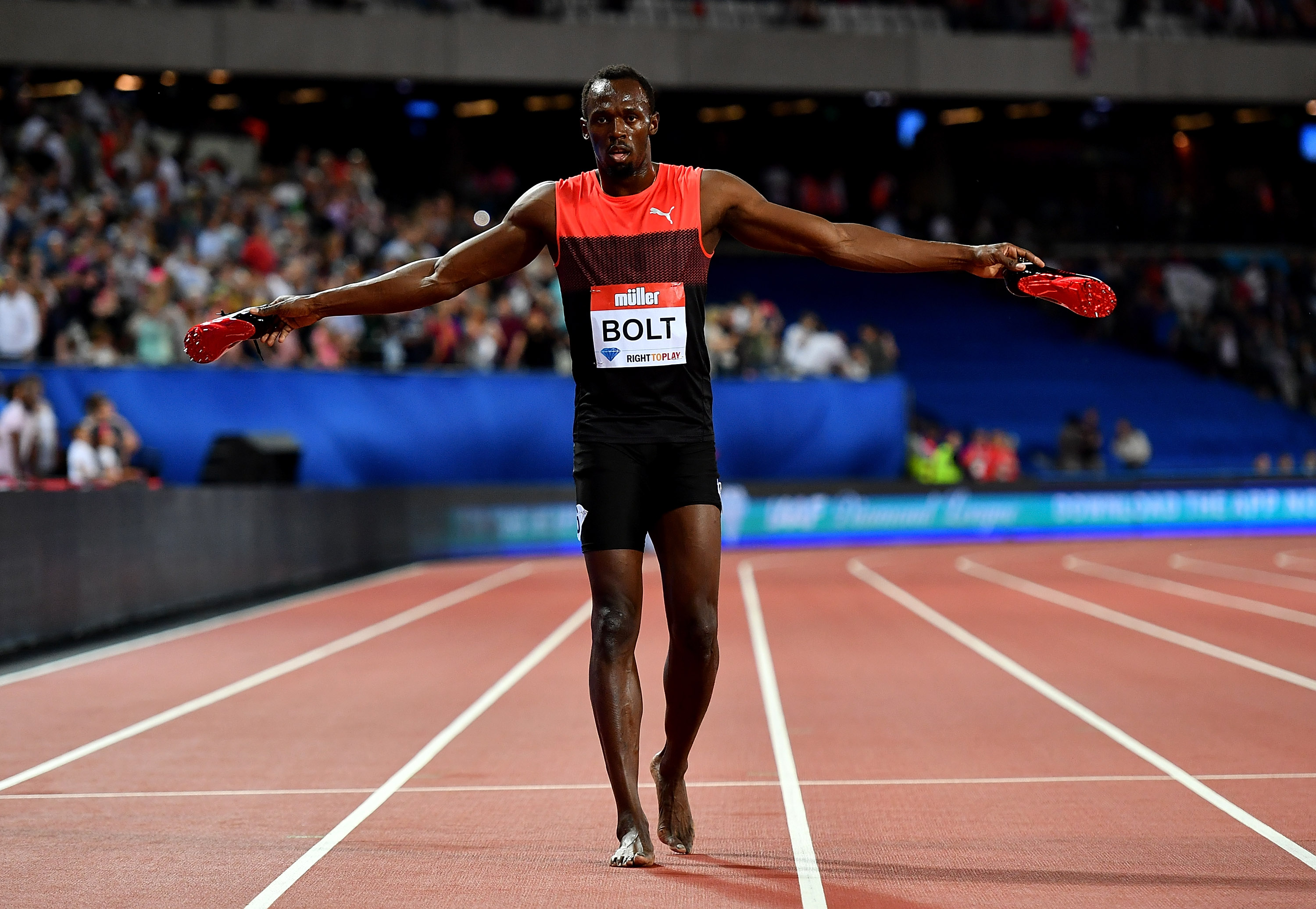
Usain Bolt of Jamaica celebrates after winning the mens 200m during Day One of the Muller Anniversary Games at The Stadium – Queen Elizabeth Olympic Park on July 22, 2016 in London, England (Dan Mullan/Getty Images)
But even the superhuman is not perfect. It is his back, that cursed back. His spine is hurt – it’s too curved. The condition is called scoliosis and with age, the pain increases. But it is not true that Superman should not train. He does not train to run, he trains to survive himself. When you’re the fastest man in the world and you run the straight or the 200m curve as no one ever has, when you have won six gold medals at the Olympics and are the only one to have won the 100, 200 and 4 x 100 relay at two editions in a row, when you think that in Rio de Janeiro you cannot but do the same thing, it is natural that just like the fastest gun in the West, there will always be someone who wants to challenge you. This means that every single day you will live only to live up to Usain Bolt, to live up to what is said about you, your name, your legend, without ever being able to run away from yourself, without being able to hide, without ever being able to say no.
And the desire to betray yourself rises up in you, the desire to rip the past from your skin, you dream of making a mistake, of losing even the damn Olympic race just so you can savor the smell of the dust, to return to being mortal, to pass days playing golf, as a rich man who has so much time to spend, and no longer feels any sense of guilt for a beer or a burger overloaded with sauce and chips as the demon of junk food dictates. “I train until I feel sick. Every day I have to run 300 meters as fast as possible, over and over again, to increase strength and endurance. Between one 300m sprint and the next I can only take a couple of minutes break. I often feel nauseous, but I put two fingers down my throat to vomit and the nausea passes, but my legs continue to burn thanks to the lactic acid and the point of no return kills me every day. God, its hard. In the words of Jesse Owens: you spend your whole life training for just ten seconds. Indeed, they are even less for me, only nine and fifty-eight”. Bring on Keep On Moving, you do not want to be found. “Lord I got to keep on moving. Lord I got to get on down. Lord I’ve got to keep on moving. Where I can’t be found”.
[widegallery][/widegallery]
Someone told him that you have been overshadowed. Usain is the revelation of Bob Marley. Which is like blasphemy. No one can be like the patron saint of Jamaica. Even you. Yet Marley saw that weightless flash of lightning. He heard the thunder and dodged the storm. He felt you coming, announcing your race, he saw how you shorten time by lengthening your stride, following the rhythm that only people from your land have. First on your playlist, there is only one song: One Love. And there is only one question I would really like to ask, is there a place for the hopeless sinner? It has been eight years since Beijing, and the day of the revelation. Do you remember? Do you remember how long nine seconds and sixty-nine miliseconds seemed? Long enough to raise his head, look to the right and left, open his arms and beat his open hand on his chest, whispering, “I am the strongest.” If you ask Usain Bolt, he tells you that 9’69” is a hundred meters, Olympic gold and the pace of the world’s fastest man’s steps, but if you ask the billions of eyes that watched a man running with unlaced shoes as if time had suddenly slowed down, those nine seconds and sixty-nine milliseconds could have been everything. They could have been a jog on the beach without even breaking onto a sweat, the confirmation that Einstein’s theory of relativity exists, a mid-summer’s breeze, a magic number from the Talmud that plays with multiples of three or three sixes of which the second is overturned. There was something mystical about it.
On August 21st, when Rio turns off the lights and kills the embers of the XXXI Olympic flame, you will be thirty years old. How do super-humans age? What happens when the steps slow down? When you are past your prime and the years pass like kicks in the back. What will life be like when you stop running faster than time? Maybe it will be like one of Wislawa Szymborska’s poems. “An exceptional opportunity to remember, if for a moment, what we talked about in the dark; to trip over a stone, just once, or get wet in the rain, and lose the keys in the grass; let your eyes follow a spark in the wind; and persist in not knowing anything important. ” We’ll find out in Rio, Usain. We’ve got to fulfill the book. Won’t you help to sing, these songs of freedom?

